- Home
- Robin Hobb
The Soldier Son Trilogy Bundle Page 27
The Soldier Son Trilogy Bundle Read online
Page 27
He did not protest that I obviously did not need the practice. Instead, he said quietly, his eyes downcast, “I would appreciate that. If you have the time.”
The other patrols left quickly. We waited impatiently for Dent, but another corporal arrived to take command of us and quick-marched us to our next class. I suddenly felt overwhelmed. It frustrated me that our destination was the same building we’d left only an hour and a half ago. Why couldn’t they have scheduled our Varnian class to follow our military history class, instead of making us rush back and forth across the campus? Only the thought that this was our last class before our noon meal sustained me.
We joined another patrol of first-years waiting in the classroom. It was our first unsupervised encounter with first-years outside of our own patrol, and after a few moments we began chatting and discovered that they, too, were new nobles’ sons. Their patrol was fifteen strong. We felt lucky to be in Carneston House when we heard that they were barracked in the top floor of Skeltzin Hall, where they shared one large open room with a single window at each end and gaps in the eaves large enough to admit pigeons and bats. They had been promised repairs before winter, but for now the evening winds off the river blew very chill.
We sat and talked, teacherless, for a quarter of an hour before Corporal Dent, very red-faced, came charging into the room, demanding to know what we were doing there and why we hadn’t waited for him. As we followed him into the hall and up a flight of stairs to the correct classroom, the other patrol’s corporal found his charges as well. They lectured us angrily about stupidly following a cadet we didn’t even recognize, and I came to realize that this had been a prank played upon Dent and his fellow, with us as ancillary victims.
We were late for the class and we received the blame for it. Mr. Arnis spoke to us in Varnian, saying that it was the only language we could use in class, to force us to become fluent more quickly. He added that if we thought we could disrespect him because he was not a military man, he would soon teach us our error. I understood the gist of what he said to us as he ordered us to take the last available seats in the back of the room. Only Trist seemed completely comfortable. He sat two chairs down from me, his pen moving effortlessly over his paper as he took notes. Before the instructor dismissed us, he had assigned us to translate the introductory passage of Gilshaw’s Journal of a Varnian Commander into Gernian, and to compose a letter in Varnian to send to our parents, telling them how much we had enjoyed our first day of Academy life. Because we had been late, he gave us the additional assignment of writing a formal apology for disrupting the class schedule. Someone in the back of the classroom groaned and our instructor permitted himself a small smile, the first sign of humor that any of our teachers had displayed.
As we had arrived late, so he kept us late, and thus any thoughts of a walk back to Carneston House or a leisurely meal were dashed. Corporal Dent was waiting for us, very annoyed that he, too, would be late for his meal. He would not let us run but formed us up and marched us back to our quarters. Before he dismissed us to take our books upstairs, he informed us, with sadistic glee, that we had all failed our first inspection of quarters. A list had been left for us and we should correct our deficiencies before going to the dining hall. After this, our inspection of quarters would take place every morning before we left for breakfast.
I was shocked by the length of the list. Our floor had not been swept and mopped, our window was dirty and the windowsill dusty. Our clothing was to be hung in our closets with all buttons fastened, facing to the left. This, I supposed, explained why each of our closets was now empty, our clothing heaped on the floor outside it. Natred’s bedding was dumped on the floor beside his bunk; evidently it had not been spread up as tidily as required. Our lamp should have been refilled with oil, its chimney wiped and the wick trimmed. The list even specified the order in which our books were to be placed on our shelves.
We hurried through our tasks. Some we shared. I swept, Nate mopped, and Kort cleaned the window and windowsill while Spink took care of the oil lamp. When our books had been neatly arranged on our shelves, we departed as a group, merging with the others as they came, complaining, out of their rooms. Trist’s room had drawn care of the common room, so they had had the task of replenishing the firewood and kindling as well as sweeping, dusting, and setting the chairs at precise intervals around the study tables. Trent had to make two trips down to his trunks in storage, carrying the extra clothing he had tried to store under his bunk. We clattered down the stairs in a herd, but before we had even emerged from the doors, Corporal Dent was shouting at us to hurry up, he didn’t relish having to wait for fools.
We were not quite the last patrol to enter the mess hall. The patrol of new nobles’ sons from Skeltzin Hall looked as harassed as we felt as they followed us in. As we gathered around our table, Corporal Dent cautioned us yet again about our manners. I do not think any of us really heard him. Our attention was fixed on the thick slices of roast pork, the large bowl of mashed turnips, and the curling strips of bacon in the molasses baked beans. Sliced bread, a large pot of butter, and several carafes of coffee also awaited us. I do not recall if there was any conversation at that meal other than the polite necessities of asking that more food or coffee be passed. We all ate, as my father would have phrased it, “like troopers,” and left not a crumb or a scrap on any platter. By the end of our meal, the welcome food weighted my belly and I thought longingly of a nap. It was not to be. Instead, there was a brisk march back to our house, where we were dismissed to gather our books and supplies for Engineering and Drawing.
These two subjects were taught as one by the same instructor. I immediately liked him the best of any of our teachers. He was certainly the eldest of our instructors, a tall man whom age had whittled down to bones and tendons. He still had the proud posture of an excellent horseman. Captain Maw warned us that he did not think we could learn these topics best from a book, but must apply the concepts immediately if they were to be fixed in our mind. His classroom was filled with a beckoning assortment of models of bridges and embankments, topography of famous battle sites, ancient ballista, pontoons, carts, and earthworks of all sorts. He did not force us to sit still through a long lecture, but invited us to leave our seats and explore his collection, assigning us to sketch three items among them before the class was over. I was pleased and glad on Spink’s behalf that Captain Maw had a large collection of miscellaneous drawing supplies and encouraged us to make use of them, for Spink had nothing, no compass, rule, nor even any variety of leads. These Maw furnished to him, matter-of-factly, saying that careless former students who had left them behind had scarcely appreciated them nor would notice their absence.
I budgeted my time carefully and created three drawings of various catapults and ballista. I was well satisfied with my attempts, for I had always excelled at drafting and had designed a bridge for a steep-banked stream near our home when I was only twelve. Spink, as engrossed in the drawing tools as if he were a boy with new toys, spent the entire period attempting an ambitious rendering of one of the topographical battle scenes. Yet I noticed that at the end of class, when we each submitted our final works, Captain Maw made no mention that Spink turned in just one sketch, saying only, “I can see you are inexperienced, yet enthusiasm and dedication can make up for much, young man. If you need additional assistance, come and see me in my office after hours.” After his humiliation in math, I think this encouragement meant much to Spink and certainly warmed my heart toward Captain Maw.
I left the building, relieved to be finished with academics for the day. Even Corporal Dent seemed in a better mood as he formed us up in our ranks and marched us back to Carneston House. He still fell back beside Gord and criticized him, referring to him again as Gorge and promising him that he’d shave him thin as a rail before his first year was through. Gord strove to keep pace with us, but in truth, his legs were short, so that he lurched and jounced along rather than marched. Dent harangued him all the way
back to our dormitory, winning not a few smiles and sniggers from some of the other cadets. Dent did have a clever wit, and the sharp observations he made about Gord, how his cheeks kept cadence with the jiggling of his belly and how he breathed through his nose like a blown horse, were piercingly accurate and delivered in such a wondering yet sarcastic tone that even I could not keep my lips from crooking.
Yet when I stole a glance in Gord’s direction to see how he was taking it, I felt a creeping shame about my secret smile. Gord soldiered on manfully, sweat already streaming down the side of his fat face. The folds of his neck bulged red above his tight collar. His eyes stared straight ahead and his face showed no expression, as if he had long been schooled to mockery. I think if he had looked flustered or embarrassed, I might have been able to smile without shame. But that he took it in stride, with dignity, even as he stoically attempted to force his body into compliance, somehow made Dent’s taunts childishly cruel. Gord was doing the best he could; there was nothing he could have done to please Dent. All amusement went out of me, and for the second time on that first day of Cavalla Academy, I discovered a worm’s trail of cowardice within my soul.
Dent dismissed us outside Carneston House, allowing us to racket into the building and up the stairs. Or so we thought. A roar of outrage from Sergeant Rufet brought us all to a sharp halt. The war veteran actually rose from his desk to confront us, and the way he reduced us to cringing puppies with two dozen words showed that Dent had a long way to go to develop the lashing tongue and acid vocabulary of the true sergeant. When he released us, we went upstairs quietly, exhibiting the self-control that we’d someday be expected to display as cavalla officers.
Our respite was brief. We were allowed just enough time to put our books and supplies away and straighten our uniforms. Then it was time to once again fall in on the parade grounds, this time for drill.
I had expected that we would go straight to the stables and the horses, and in truth I had looked forward to being in a saddle again and seeing what sort of mount our new Academy commander had procured for us. Instead, in our small patrols we spent the better part of the fall afternoon with Dent, practicing basic drill. His inexperience at teaching was as great a handicap to us as our inexperience at marching. I knew the fundamentals of drill, for Sergeant Duril had taught them to me, just as he had schooled my normal stride to twenty inches, the standard for marching troops. But I had never drilled with a group of men, where one must watch one’s fellows from the corner of one’s eye and match both pace and stride to the patrol.
Some of the others did not know even how to do an “about-face.” We repeated these over and over, with those of us who knew them standing like oxen in harness while Dent harangued those who did not and made them endlessly shift from “attention” to “parade rest” and back again. It was almost a relief when he decided to get us into motion. He marched us back and forth, back and forth, seeming to become more discontented and more distraught with our ragged lines and uneven response to his bellowed commands. Those of us who quickly caught on to drill could do nothing for those who did not, nor could we make our entire patrol look better than the worst soldier in it. Gord took a heavy share of Dent’s abuse, as did Rory, for he walked with a rolling gait and bent elbows. Kort had a longer stride than the rest of us, and when he attempted to shorten it, he appeared always on the verge of stumbling, while gangly Lofert could not seem to master the difference between right and left on any of the commands. He was always a second behind the rest of us as he strove to go in the correct direction by spying on the cadet beside him.
Dent cursed us all roundly but without Sergeant Rufet’s skill. I could not understand why he could not teach us calmly, until I spied Cadet Captain Jaffers and Colonel Stiet standing to one side of the parade ground. Jaffers had a notebook in his hands and seemed to be critiquing each patrol under Stiet’s watchful eyes. Caulder Stiet stood just behind his father and to his left, scrutinizing us as well. I wondered if he contributed comments to our critique. I was beginning to understand Sergeant Rufet’s apparent intolerance for the boy. It was annoying that this pup seemed to have his father’s ear on all facets of the Academy, and yet were I his father and in a similar position, would not I try to teach my boy by my example? Even as I tried to justify his presence that way, I knew that my own father would have expected me to exhibit far more humility and would not have suffered me to wear a cadet’s uniform until I had truly earned it.
Such thoughts occupied my mind and made me perform a “column left” turn when the command had been “left flank.” I threw our entire patrol out of stride and was given a demerit to march off before I could go to my study hours.
I was not alone in my punishment. When Dent finally dismissed us after a final dressing-down, almost every cadet on the ground had a demerit or six to march off. These consisted of marching the perimeter of the parade ground, pausing to salute every direction of the compass at each corner. I had never before experienced such a useless discipline, and resented this waste of time that would have been better spent with my books. Rory, Kort, and Gord were still marching when I finished my single demerit and left them to go back to Carneston House.
I had hoped for a time of quiet alone with my books. My upbringing had been in many ways solitary, and the constant companionship and noise were beginning to grate on me. But there was no peace when I returned to my quarters. The long tables in our central room were already crowded with cadets, books, papers, and inkwells. A corporal I did not recognize presided over us as a study mentor. He circled the table like a dog at dinner, making comments and answering questions and providing help to those who needed it. I quickly fetched my books and found a place at the corner of the table next to Spink.
I was grateful for my father’s foresight in preparing me for my lessons. I knew the material and had only to endure the drudgery of writing out information I was already familiar with. Many of the others were not so fortunate. Writing arm cramped tightly to my side, I finished my language and history assignments and then took out my math. The set of exercises Captain Rush had given were basic calculations, not difficult at all, which made doing them even more tedious. At least I’d only earned the first set of problems in addition to the regular review assignment. A few of the other fellows had four sets to complete tonight. Trist was finished before any of us, and bid us a cheerful farewell as he headed off to the quiet and relative comfort of his room. Beside me, Spink labored with many blotches through his Varnian translation exercise and then composed the letter to his mother.
I had nearly finished my math when he took out his book and opened it reluctantly to the very first page. I watched him as he studied the given examples and then headed his paper for the first set of problems. He took a deep breath, as if he were about to dive off a bridge, and began. Our proctor came and stood behind him. Midway through Spink’s second problem, he leaned over him. “Six times eight is forty-eight. That’s your error, on this and on the first problem. You need to drill yourself on your basic arithmetic facts or you’ll not get far at the Academy. I’m shocked that you don’t know them already.”
Spink got even quieter, if that were possible, keeping his eyes fixed on his paper as if he feared to face mockery if he looked up from it.
“Did you hear me?” the corporal prodded him. “Go back and fix the first one before you continue.”
“Yes, sir,” Spink replied softly, and began carefully rubbing out the error on his paper as the corporal continued his circuit of the table. The arrival of Rory and Kort took up his attention for some time. He had just given them places at the table when a very red-faced Gord came puffing up the stairs. Perspiration had left wet tracks down the side of his face into the rolls of his neck. He smelled of sweat from marching off his demerits, not a clean man’s sweat but a sour spoiled-bacon stink. “Whew!” someone exclaimed in soft disdain after he had passed through the room on his way to hang up his coat and get his books.
“I think I’ve
finished,” Natred announced in a way that left no doubt he was actually fleeing Gord’s arrival. He gathered up his books and papers, leaving an empty chair on the other side of Spink. As Natred left the room, Gord entered, his books under his arm. He sank down gratefully in the vacated chair and put his books on the table. He grinned at me past Spink, obviously relieved to be off his feet. “What a day!” he exclaimed to no one in particular, and the proctor rebuked him with, “We are here to study, Fats, not socialize. Get to work.”
I saw it again, as if Gord had donned a cold mask. His face stilled, his eyes went distant, and without a word he opened his books and bent to his task. I do not know what made me keep my place at the table. I longed to be alone, and yet there I sat. I saw Spink begin his third problem. He wrote it out carefully and then began to set it up. I touched his hand lightly. “There’s an easier way to set that up. May I show you?”
Spink reddened slightly. He glanced toward the proctor, expecting a rebuke. Then, deciding to forestall it, he raised his hand and said, “May I request that Cadet Burvelle be allowed to assist me with my assignment?”
I mentally cringed, expecting a scathing onslaught from the corporal. Instead, he nodded gravely. “Assist, not do it for you, Cadet. Assisting a fellow cavallaman is well within our traditions. Go to it.”
So we did, whispering quietly together. I showed him how to set up the problem, and he worked it gravely, arriving at the correct answer with only one prod from me, again on his calculation. But when he said, “It’s much easier. But I don’t understand why I can set it up this way. It seems to me we’re skipping a step.”
“Well, it’s because we can,” I said, and then paused, perplexed. I knew what I had done, and I’d done similar problems a hundred times. But I had never thought to ask my math tutor why it could be done that way.

 Ship of Destiny
Ship of Destiny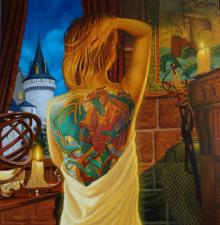 Golden Fool
Golden Fool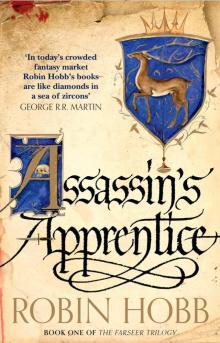 Assassins Apprentice
Assassins Apprentice The Dragon Keeper
The Dragon Keeper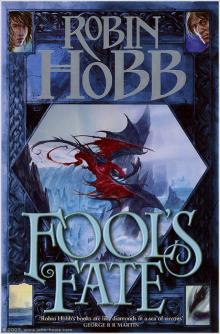 Fools Fate
Fools Fate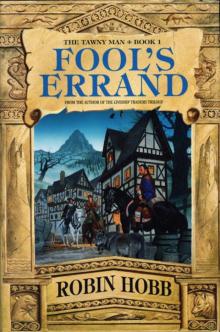 Fools Errand
Fools Errand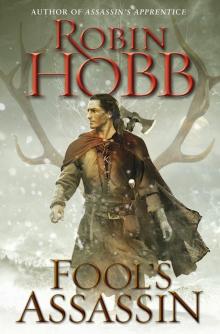 Fools Assassin
Fools Assassin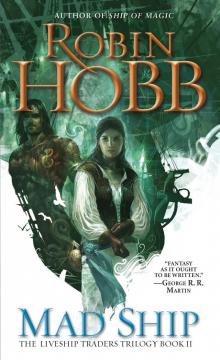 The Mad Ship
The Mad Ship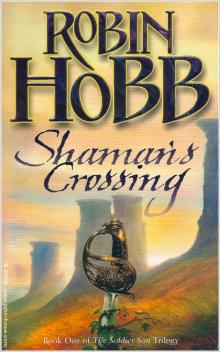 Shamans Crossing
Shamans Crossing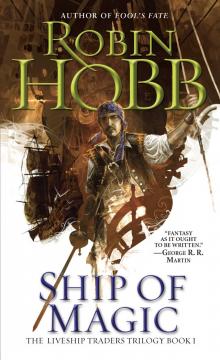 Ship of Magic
Ship of Magic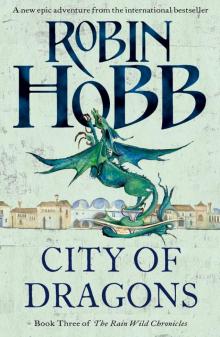 City of Dragons
City of Dragons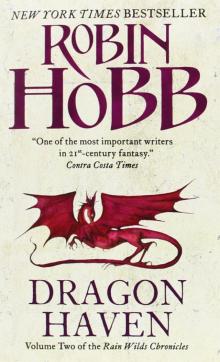 Dragon Haven
Dragon Haven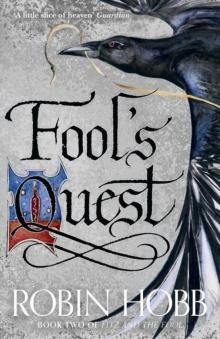 Fools Quest
Fools Quest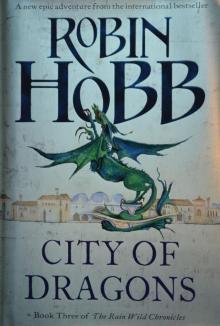 Blood of Dragons
Blood of Dragons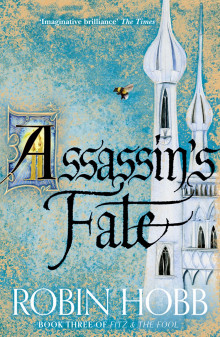 Assassin's Fate
Assassin's Fate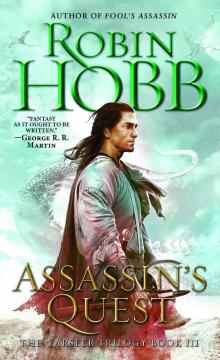 Assassins Quest
Assassins Quest Renegades Magic
Renegades Magic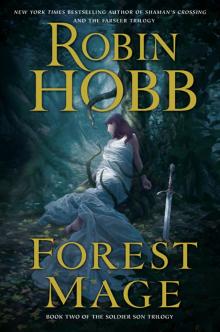 Forest Mage
Forest Mage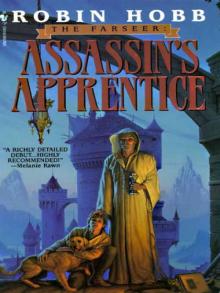 Assassin's Apprentice tft-1
Assassin's Apprentice tft-1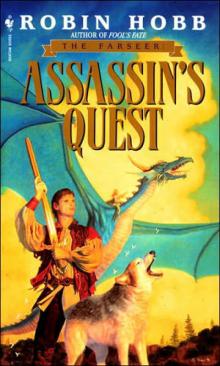 Assassin's Quest tft-3
Assassin's Quest tft-3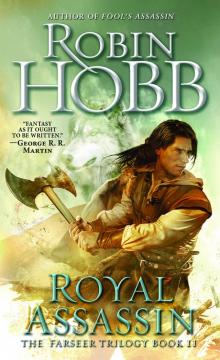 Royal Assassin
Royal Assassin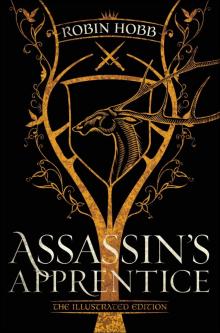 Assassin's Apprentice (The Illustrated Edition)
Assassin's Apprentice (The Illustrated Edition) Assassin's Quest (UK)
Assassin's Quest (UK)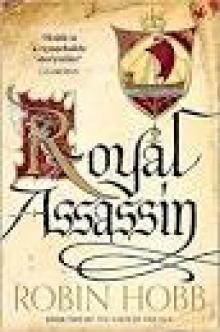 Royal Assassin (UK)
Royal Assassin (UK)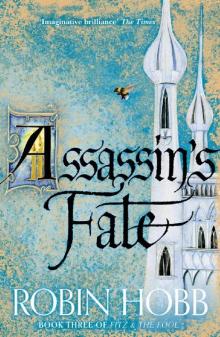 FF3 Assassin’s Fate
FF3 Assassin’s Fate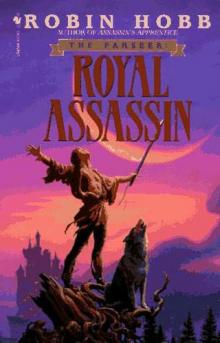 Royal Assassin tft-2
Royal Assassin tft-2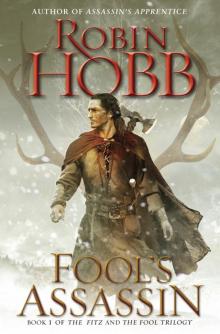 Fool’s Assassin: Book One of the Fitz and the Fool Trilogy
Fool’s Assassin: Book One of the Fitz and the Fool Trilogy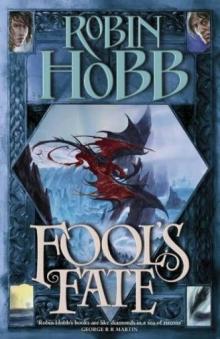 Fool's Fate ttm-3
Fool's Fate ttm-3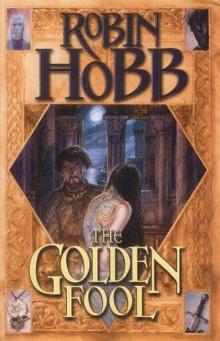 The Golden Fool ttm-2
The Golden Fool ttm-2 The Liveship Traders Series
The Liveship Traders Series The Wilful Princess and the Piebald Prince
The Wilful Princess and the Piebald Prince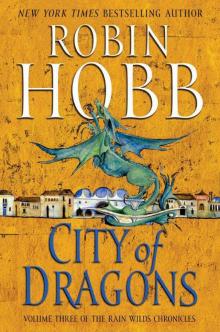 City of Dragons rwc-3
City of Dragons rwc-3 The Tawny Man 1 - Fool's Errand
The Tawny Man 1 - Fool's Errand Words Like Coins
Words Like Coins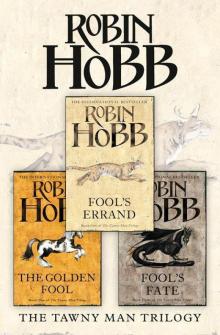 The Complete Tawny Man Trilogy Omnibus
The Complete Tawny Man Trilogy Omnibus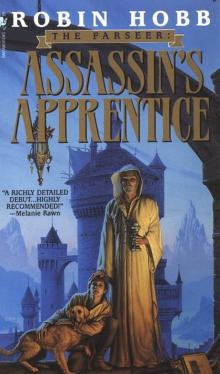 Farseer 1 - Assassin's Apprentice
Farseer 1 - Assassin's Apprentice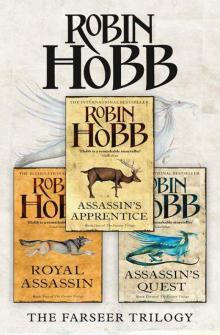 The Complete Farseer Trilogy Omnibus
The Complete Farseer Trilogy Omnibus The Soldier Son Trilogy Bundle
The Soldier Son Trilogy Bundle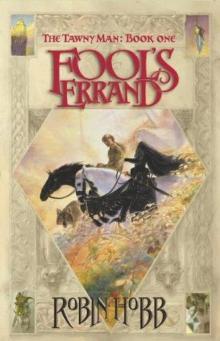 Fool's Errand ttm-1
Fool's Errand ttm-1 Blue Boots
Blue Boots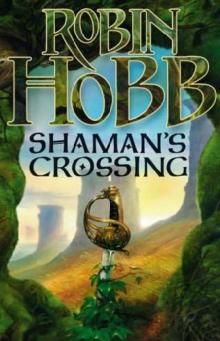 Shaman's Crossing ss-1
Shaman's Crossing ss-1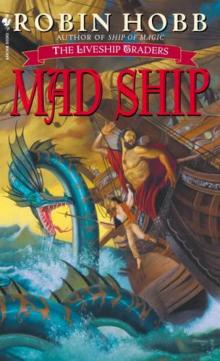 Mad Ship
Mad Ship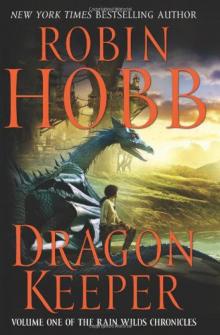 Dragon Keeper
Dragon Keeper The Willful Princess and the Piebald Prince
The Willful Princess and the Piebald Prince Ship of Destiny tlt-3
Ship of Destiny tlt-3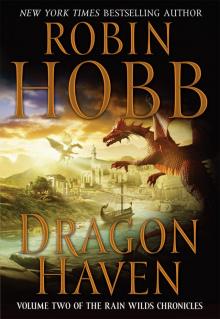 Rain Wild Chronicles 02 - Dragon Haven
Rain Wild Chronicles 02 - Dragon Haven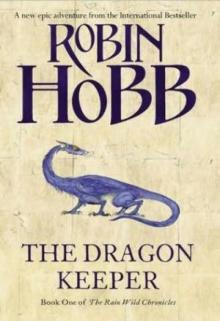 The Dragon Keeper trwc-1
The Dragon Keeper trwc-1 The Triumph
The Triumph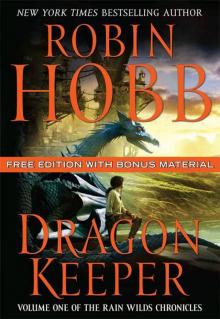 Dragon Keeper Free Edition with Bonus Material
Dragon Keeper Free Edition with Bonus Material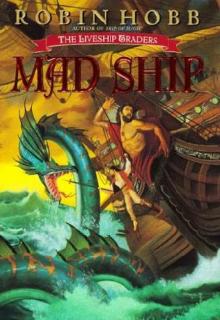 Mad Ship tlt-2
Mad Ship tlt-2 The Inheritance and Other Stories
The Inheritance and Other Stories Tawny Man 02 - Golden Fool
Tawny Man 02 - Golden Fool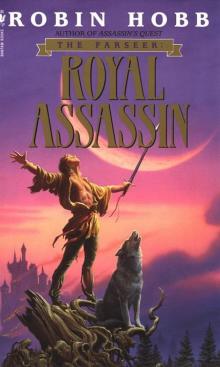 Farseer 2 - Royal Assassin
Farseer 2 - Royal Assassin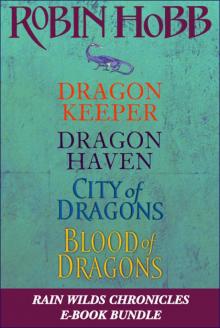 Rain Wilds Chronicles
Rain Wilds Chronicles Forest Mage ss-2
Forest Mage ss-2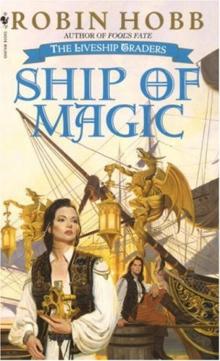 Ship of Magic lt-1
Ship of Magic lt-1 Renegade's Magic ss-3
Renegade's Magic ss-3